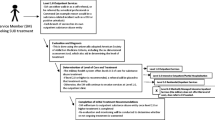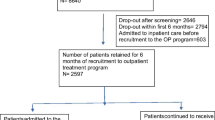Abstract
BACKGROUND: Substance-abusing adults are admitted to hospitals for medical complications from their drug and alcohol use at substantially higher rates than the general public; yet, their care is often defined by against medical advice (AMA) discharges and low rates of referral to addiction treatment programs.
METHODS: We present findings from a chart review of consecutive admissions to an integrated medical-substance abuse treatment program designed for acutely ill, hospitalized substance using adults. We specifically looked at factors associated with program completion and medical complications in this cohort of at-risk adults.
RESULTS: Overall, 83 patient cases were studied. The mean age was 41.2 years; most were African American (73.5%), male (68.7%), and homeless (77.1%). Heroin (96.4%) and cocaine (88.0%), followed by alcohol (44.6%) were the most commonly used substances before admission. The most common admitting diagnoses were infectious endocarditis (43.4%), abscess or nonhealing ulcer (18.1%), and osteomyelitis (13.3%) with intravenous antibiotic (68.7%), physical therapy (48.2%), or wound care (41.0%), the most commonly prescribed care on the integrated care/day hospital unit. The mean length of stay in the day hospital was 12.4 days. Overall, 69.9% of patients successfully completed their medical therapy, and 63.9% were successfully referred to an outpatient substance abuse treatment program. Only 10.8% required an unscheduled hospital readmission and 15.7% required an after-hours emergency department visit during their stay.
CONCLUSION: Outpatient/day hospital-based integrated treatment is a viable option for medically ill substance-abusing adults who would otherwise be hospitalized and is associated with higher than expected completion rates and low rate of complications. Co-locating the unit at a hospital and integrating extensive social supports appear to be key components to this model.
Similar content being viewed by others
References
Stein MD, O’Sullivan PS, Ellis P, Perrin H, Wartenberg A. Utilization of medical services by drug abusers in detoxification. J Subst Abuse. 1993;5:187–93.
O’Connor PG, Samet JH, Stein MD. Management of hospitalized intravenous dug users: role of the internist. Am J Med. 1994;96:551–8.
Stein MD, Wilinson J, Berglas N, O’Sullivan P. Prevalence and detection of illicit drug disorders among hospitalized patients. Am J Drug Alcohol Abuse. 1996;22:463–71.
Chan AC, Palepu A, Guh DP, et al. HIV-positive injection drug users who leave the hospital against medical advice: the mitigating role of methadone and social support. J Acquir Immune Defic Syndr. 2004;35:56–9.
Substance Abuse and Mental Health Services Administration, Office of Applied Studies, 2004. Treatment Episode Data Set (TEDS): 1992–2002.
Bradley CJ, Zarkin GA. An inpatient profile of patients with a substance abuse diagnosis in Maryland. J Subst Abuse Treat. 1997;14:155–62.
Deehan A, Taylor C, Strong J. The general practitioner, the drug misuser, and the alcohol misuser: major differences in general practitioner activity, therapeutic commitment, and “shared care” proposals. Br J Gen Pract. 1997;47:705–9.
Williams H, Salter M, Ghodse AH. Management of substance misusers on the general hospital ward. Br J Clin Pract. 1996;50:94–8.
Saitz R, Friedmann PD, Sullivan LM, et al. Professional satisfaction experienced when caring for substance-abusing patients: faculty and resident physician perspectives. J Gen Intern Med. 2002;17:373–6.
Hopper JA, Shafi T. Management of the hospitalized injection drug user. Infect Dis Clin North Am. 2002;16:571–87.
Stein MD. Medical consequences of substance abuse. Psychiatr Clin North Am. 1999;22:351–70.
Aszalos R, McDuff DR, Weintraub E, Montoya I, Schwartz R. Engaging hospitalized heroin-dependent patients into substance abuse treatment. J Subst Abuse Treat. 1999;17:149–58.
Friedmann PD, D’Aunno TA, Jon L, Alexander JA. Medical and psychological services in drug abuse treatment; do stronger linkages promote client utilization. Health Serv Res. 2000;35:443–65.
Willenbring ML, Olson DH, Bielinski J. Integrated outpatient treatment for medically ill alcoholic men: results form a quasi-experimental study. J Stud Alcohol. 1995;56:337–43.
Weisner C, Mertens J, Parthasarathy S, Moore C, Lu Y. Integrating primary medical care with addiction treatment: a randomized controlled trail. JAMA. 2001;286:1715–23.
Palepu A, Tyndall MW, Leon H, et al. Hospital utilization and costs in a cohort of injection drug users. Can Med Assoc J. 2001;165:415–20.
Laine C, Hauck WW, Gourevitch MN, Rothman J, Cohen A, Turner BJ. Regular outpatient medical and drug abuse care and subsequent hospitalization of persons who use illicit drugs. JAMA. 2001;285:2355–62.
Weisner C, Schmidt LA. Expanding the frame of health services research in the drug abuse field. Health Serv Res. 1995;30:707–26.
McDuff DR, Solounias BL, Beuger M, Cohen A, Klecz M, Weintraub E. A substance abuse consultation service. Enhancing the care of hospitalized substance abusers and providing training in addiction psychiatry. Am J Addict. 1997;6:256–65.
Chick J, Lloyd G, Crombie E. Counselling problem drinkers in medical wards: a controlled study. Br Med J. 1985;290:965–7.
Welter JW, Perry P, Longabaugh R, Clifford PR. An outcome evaluation of a hospital-based early intervention program. Addiction. 1998;93:573–81.
Dunn CW, Ries R. Linking substance abuse services with general medical care: integrated, brief interventions with hospitalized patients. Am J Drug Alcohol Abuse. 1997;23:1–13.
Ryan RM, Deci EL. Intrinsic and extrinsic motivations: classic definitions and new directions. Contemp Educ Psychol. 2000;25:54–67.
Jankowski CB, Drum DE. Diagnostic correlates of discharge against medical advice. Arch Gen Psychiatry. 1977;34:153–5.
Hwang SW, Li J, Gupta R, Chien V, Martin RE. What happens to patients who leave hospital against medical advice? Can Med Assoc J. 2003;168:417–20.
Aliyu ZY. Discharge against medical advice: sociodemographic, clinical and financial perspectives. Int J Clin Pract. 2002;56:325–7.
Bell DC, Williams ML, Nelson R, Spence RT. An experimental test of retention in residential and outpatient programs. Am J Drug Alcohol Abuse. 1994;20:331–40.
Author information
Authors and Affiliations
Corresponding author
Additional information
The authors have no conflicts of interest to report.
Dr. O’Toole is funded by a NIDA career development award K23DA13988-01.
Rights and permissions
About this article
Cite this article
O'Toole, T.P., Conde-Martel, A., Young, J.H. et al. Managing acutely III substance-abusing patients in an integrated day hospital outpatient program. J Gen Intern Med 21, 570–576 (2006). https://doi.org/10.1111/j.1525-1497.2006.00398.x
Received:
Revised:
Accepted:
Issue Date:
DOI: https://doi.org/10.1111/j.1525-1497.2006.00398.x




